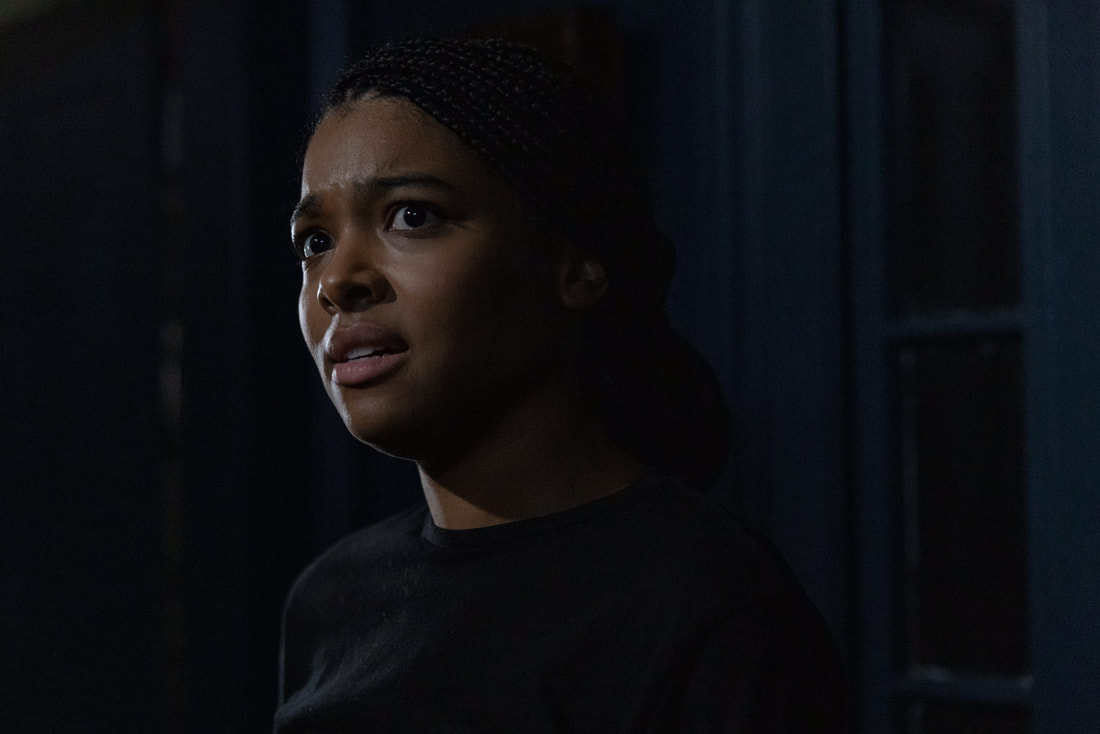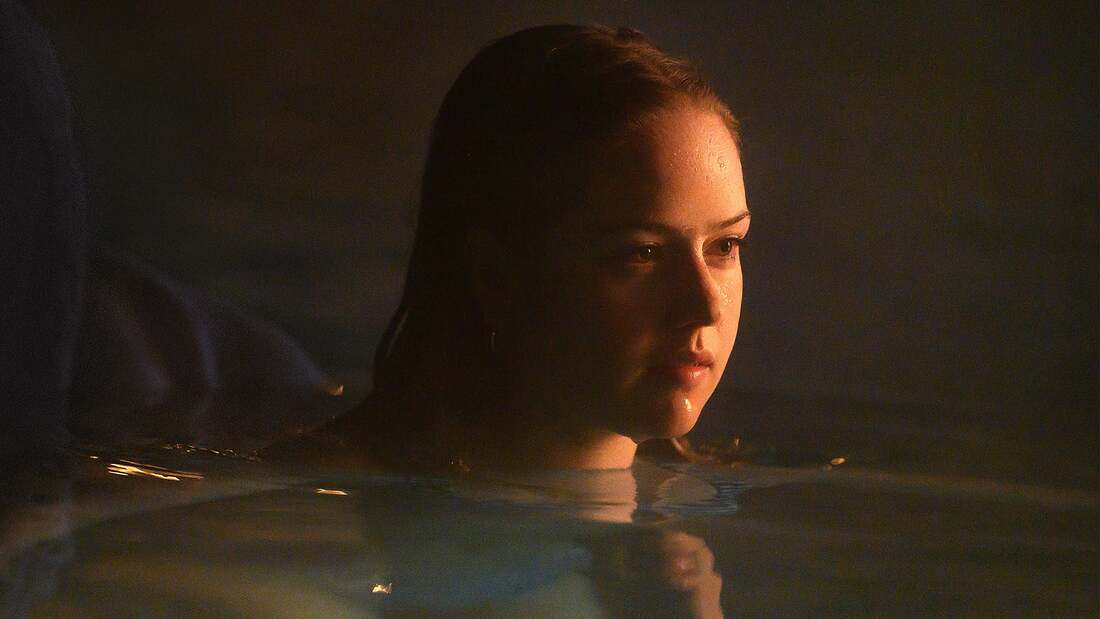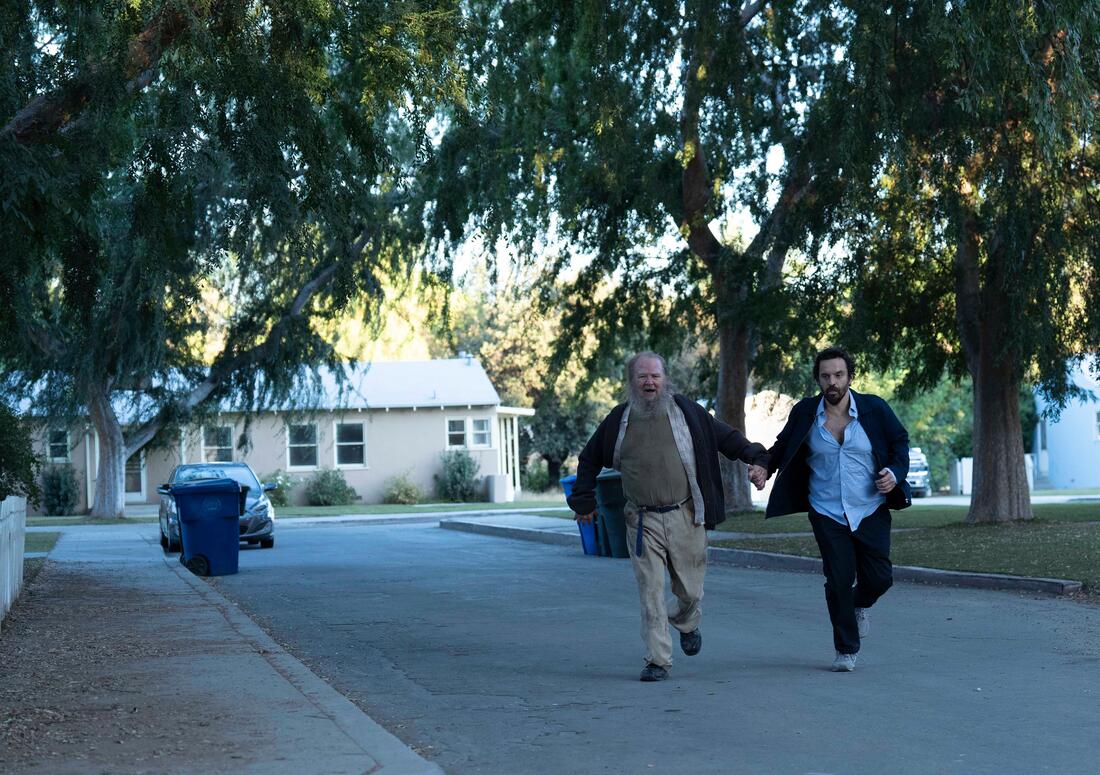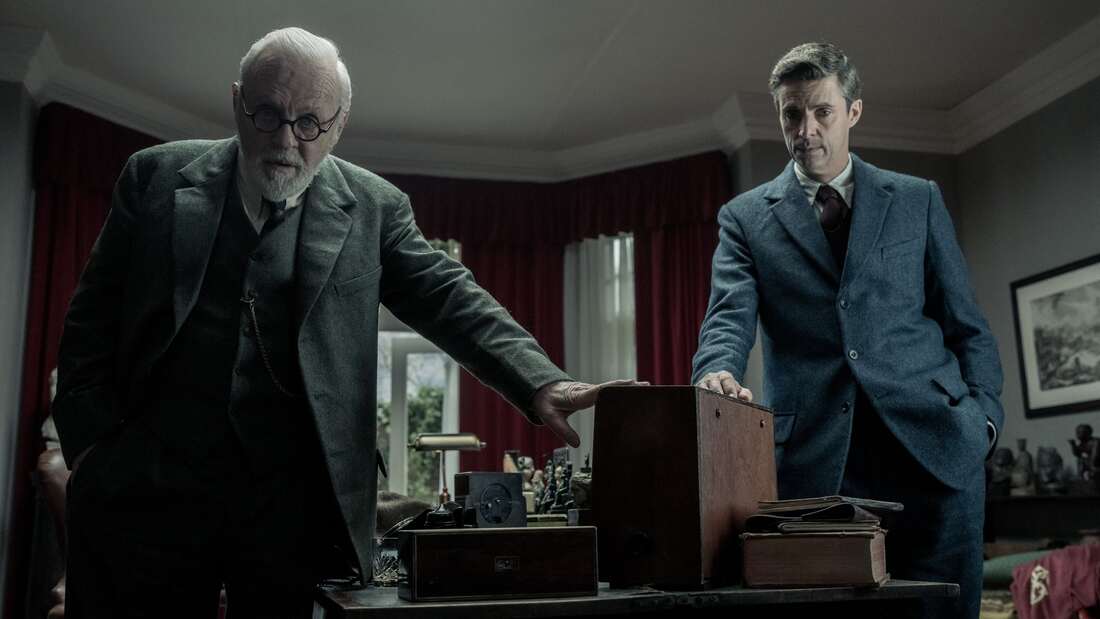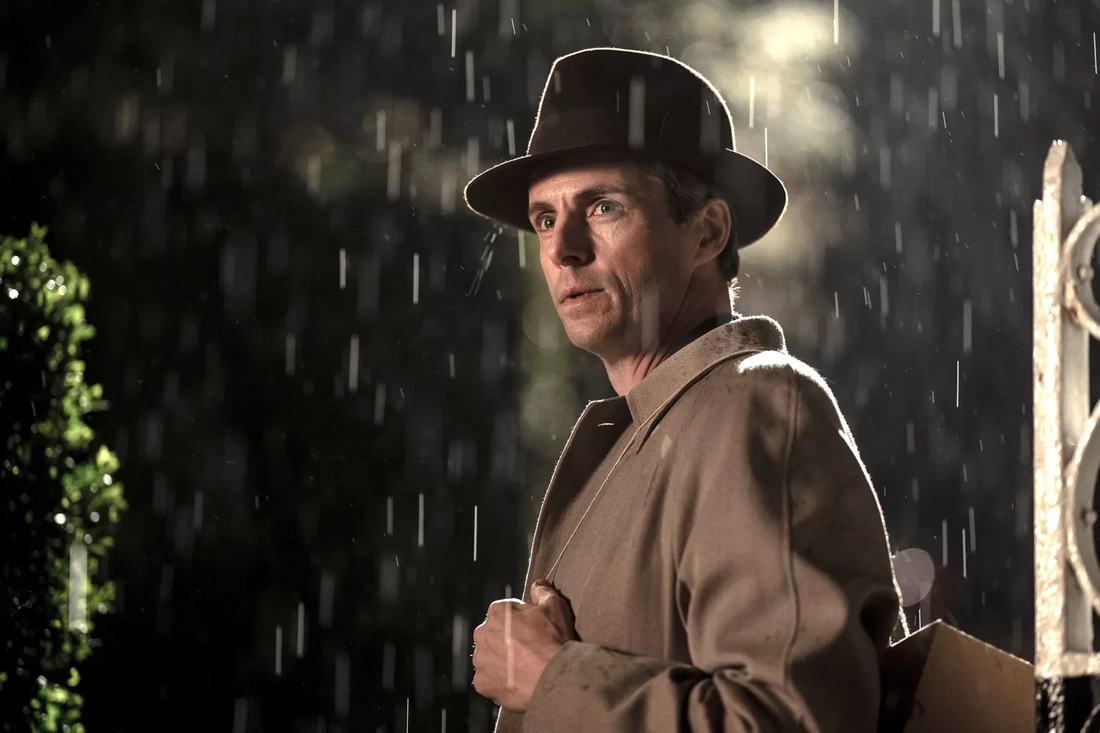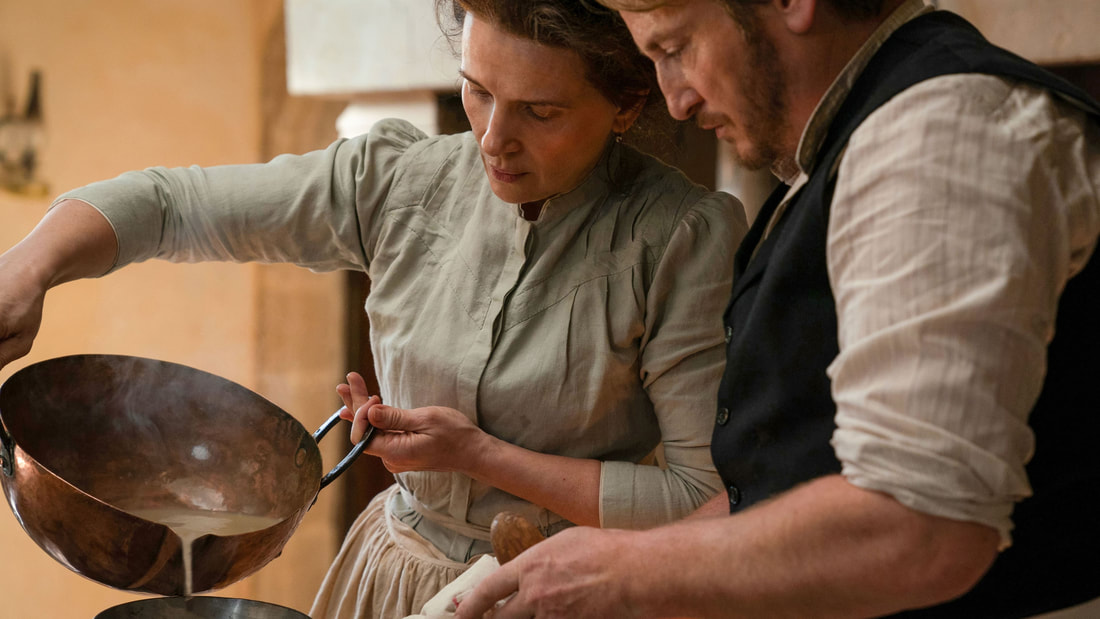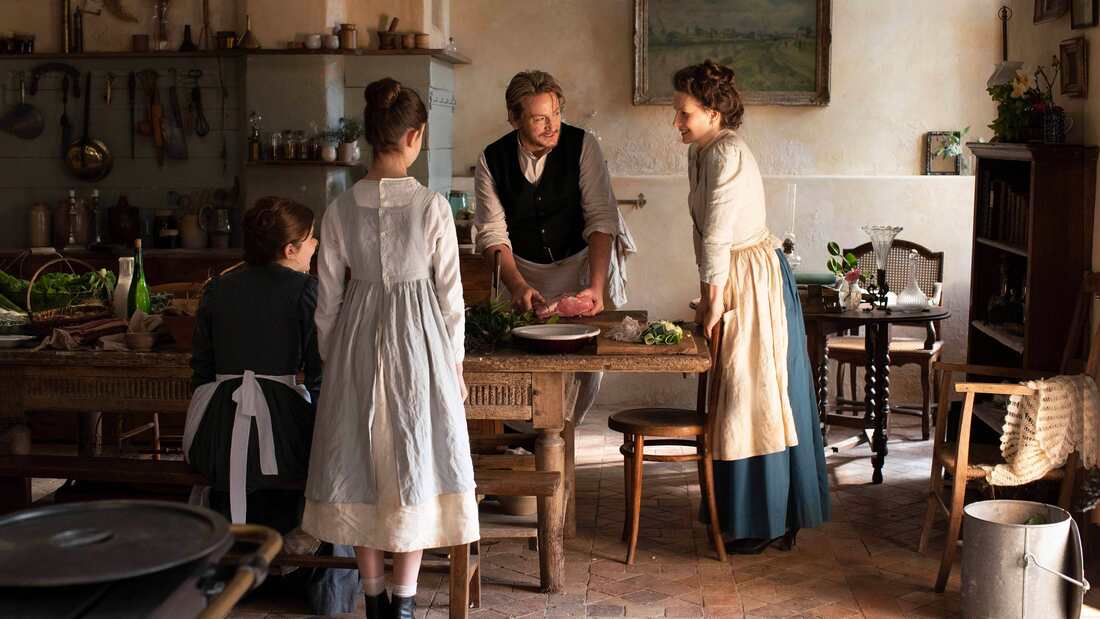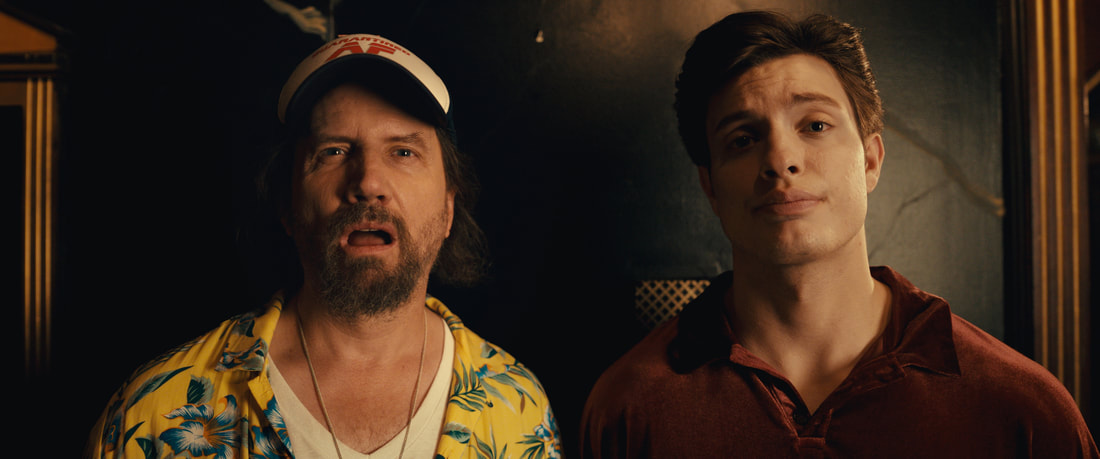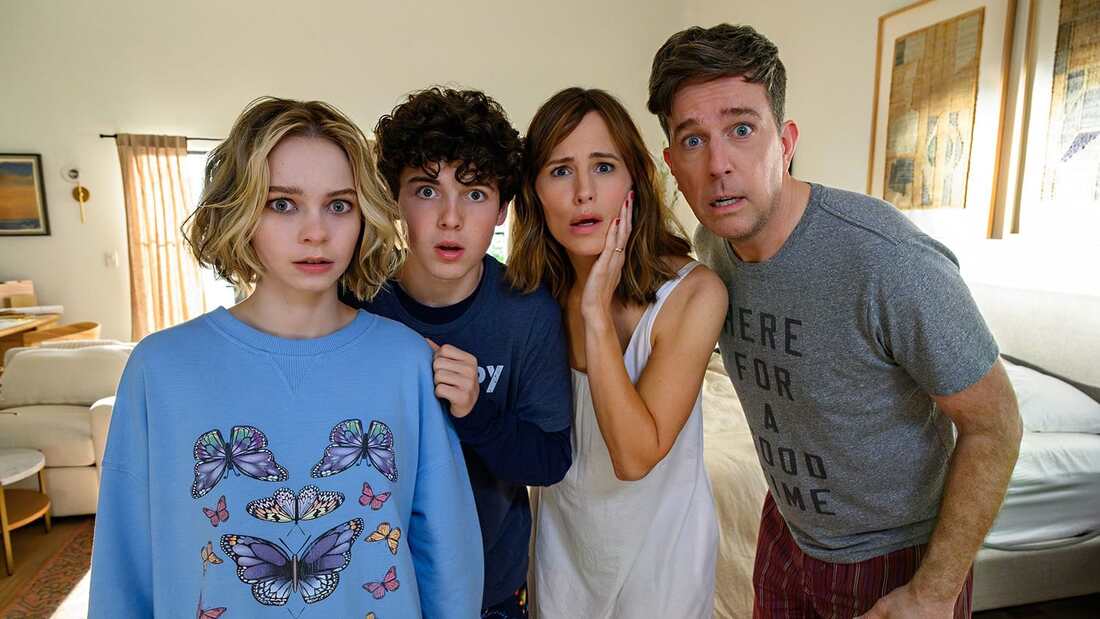|
Review by Cole Groth To put it simply, Founders Day is fine. People with a proclivity for campy kills and stupid dialogue, this film is for you. For those uninterested in slashers or who aren’t already fans of this genre shouldn’t use this as the slasher benchmark because it’s a tonally confusing mess for the most part. With a few decent scares, this is only a bit worse than your average slasher flick. Founders Day tells the story of a small town shaken up after a masked killer begins hunting down the various townspeople in the days leading up to an unusually intense mayoral election. Twists and turns ensue. There are plenty of characters to follow, but the leads here are two teenagers, played by Naomi Grace and Devin Druid. Rounding out the cast is a smattering of decent actors waiting to be slaughtered, including William Russ, Amy Hargreaves, Catherine Curtin, Emilia McCarthy, Jayce Bartok, and Andrew Stewart-Jones. Each character is pretty interesting, and most are nicely acted. The biggest place this film struggles is in its politics. It’s nice that the movie is trying something new with a political twist, but it falls flat because of its lack of nuance. There’s a generic asshole politician who’s a clear stand-in for Donald Trump. He’s brash and obnoxious — a clear villain from the start. It’s all so eye-rollingly evident from the get-go and has nothing new to say. Even if it’s pretty cringeworthy, another big fault is that it doesn’t go far enough with the politics. It’s just cringy enough to be noticeable but not ballsy enough to go all out. As far as the kills go, this is decent. There are a few creatively inspired deaths and a few standard ones. It’s a good mix; this is where slasher fans will enjoy the film. The kills are just silly enough to be fun but also scary enough to be taken seriously. That said, the special effects on so many of the kills fall flat. Digital blood is used in a few kills and looks absolutely ridiculous. Some of the practical stuff is weird, too. There’s one throat-slitting kill where the knife slides at an odd angle. It takes you out of the immersion, and that’s important for horror films.
Like the kills, the technical stuff is a mixed bag as well. The cinematography is pretty good, but the lighting is all off. Sometimes, it’s a visually interesting film. Other times, it’s plain and uninspired. The score is generic as far as slashers go. Don’t go into this expecting a great-looking movie. The editing is a little manic, too. Sometimes, it’s hard to follow. The big killer reveal at the end is convoluted but also plenty of fun. By the end of it all, Founders Day amounts to a campy yet mostly enjoyable time. If I had to describe it briefly, it would be “Scream if it was political and much worse.” The kills are alright, the characters aren’t very good, and the writing sucks. It’s a little forgettable but ultimately a little better than its worst moments. Again, if you enjoy this genre a lot, you might have a good time. If you don’t like them, you definitely won’t like this, either. Founders Day releases in theaters starting January 19. Rating: 2.5/5
0 Comments
Review by Cole Groth Have you ever gone out swimming all alone at night? After watching Night Swim, I doubt you ever would again. This creepy Blumhouse production is the first wide release of 2024, and if it’s any indication of how the year will go, we’ll be fine. It’s certainly better than your average studio horror flick. With great scares and a fresh premise, this horror film is worth the dive. Night Swim is the directorial debut of writer/director Bryce McGuire, who made a short film of the same title a decade ago. The premise is simple: after being pushed out from his life as a professional baseball player because of an MS diagnosis, Ray Waller (Wyatt Russell) and his family, including wife Eve (Kerry Condon), daughter Izzy (Amélie Hoeferle), and son Elliot (Gavin Warren), settle into a new house. It’s a quaint home in a lovely city. The only problem? The pool’s haunted. Typically, films with this type of silly premise don’t embrace what’s advertised and find a way to turn it into your average ghost story. Here, the pool is haunted, and McGuire does not lose focus of that. It works very well because it’s a believable story. The family starts experiencing scary things when they swim in the pool at night, but they’re initially hesitant because why would anything bad happen in their pool? When things get too freaky, Eve works with her children to figure out what’s happening. Meanwhile, Ray is drawn to it because of the mysterious healing properties helping him with his illness. There are a few moments where the film drags, and at a 98-minute runtime, you can’t help but wonder if it would be better at an even 90 minutes. Outside of that, though, there isn’t much to complain about. For a PG-13 horror movie, this is full of surprisingly great scares. There’s a good combination of your typical jump scares, creepy monsters, and weird blood things, keeping the film feeling very original. It’s not afraid to get gory, but it also isn’t a gross experience. There’s one particular scare toward the end of the film that, without spoiling anything, works so well that you almost wish the rest of the film was intense. McGuire does an excellent job of balancing body horror with ordinary scares and crafts a horror experience worthy of a big-screen watch.
On a technical level, there’s a lot to appreciate here. The cinematography stands out as particularly interesting, with cinematographer Charlie Sarroff taking advantage of the creepiness of being alone in the water at night. The set design is great because the home and pool used by the family in this film actually feel lived in. It’s a little thing, but so many movies fail to make homes feel like actual places of residence, and that’s not the case here. Night Swim ticks all the boxes you’d want from a horror movie. First and foremost, it’s scary. It doesn’t rely on one method to get you out of your seat and instead crafts a creepy narrative that’s original in its scares. It’s nicely shot and has great performances. Kerry Condon, in particular, stands out. McGuire is confident in the premise of his film, which makes it work so much better. His script has plenty of well-timed jokes that cut through the tension, but he never once makes a joke out of the creepy pool where the film takes place. It’s an all-around solid experience that earns its title as the first good theatrical release of 2024. Night Swim releases in theaters starting January 5. Rating: 3.5/5 Review by Cole Groth If you were offered $1 million to survive a 30-day hunt for your life, would you take it? Probably not. If Andy Samberg offered you this opportunity and added in a loophole, allowing you only to be hunted when you’re completely alone, would you take the chance now? Jake Johnson proposes this absurd and fascinating concept in Self Reliance. Johnson’s directorial debut matches the humor from his acting career but fundamentally misses the mark since it doesn’t take anywhere near full advantage of the concept. In this comedy, we follow Tommy (Johnson), a so-so man whose dull life takes an exciting turn after being proposed the earlier-mentioned idea. He has 30 days to live, all while trying to keep somebody by his side to keep him alive. At first, his family refuses to help him because they think he’s going insane - which is a little silly because Tommy doesn’t seem like the kind of guy to lose his mind this completely. Several days go by without any hunters in sight, but once he spots somebody coming after him, he hires a homeless man (Bill Wiff) to always be by his side. Thus, no hunters come after him. After the film becomes a little boring, Johnson introduces Anna Kendrick’s character of Maddy. Maddy also claims to be a part of the game, leading the two to pair up in an effort to beat the game together. Again, though, with 30 days of the game to be played, the premise becomes stale very quickly. The issue with this movie is that the hunters never feel like a threat. In fact, they aren’t even much of a thought in the background. We know they exist because the film keeps flashing a counter to show us how many days are left, and the characters talk about it constantly, but Tommy rarely has to survive these attackers, and when they do come after him, it’s lame. The 30 days of survival is too long of a time period because we skip through weeks at a time with almost nothing happening. If he made the game take place over a week and instead spent more time each day, the film would feel much more thought out.
As far as the cast goes, Self Reliance works. Johnson is a very funny leading man, playing Tommy with a level of sincerity that helps the film from feeling too goofy. Bill Wiff is hilarious as the homeless man turned sidekick for survival. Anna Kenrick is underutilized and doesn’t quite give the film her all — although it’s plain to see that her character’s writing holds her back, too. Andy Samberg makes a couple of brief appearances and steals the show every time. The rest of the cast does a pretty good job, but nothing is too notable. Self Reliance is decent on a technical level but, again, will leave you feeling ‘meh’ after watching it because some great action sequences would’ve elevated the film to something so much more. It ends up feeling a little like a first draft of the finished product because there aren’t enough jokes to keep you laughing throughout the lack of thrills. With a better script behind it, this has a lot of potential to be great, but what stands is a funny movie without much to keep it feeling like the dark comedy it desperately wants to be. Self Reliance releases in theaters for one night only on January 3 and hits Hulu on January 12 Rating: 2.5/5 Review by Cole Groth A new champion has emerged between Adam Driver’s two biopics where he puts on a ridiculous Italian accent in Michael Mann’s Ferrari. This isn’t to say that the film is a masterpiece — neither one is. But, where House of Gucci was a dreadfully stupid movie that never found its footing, it has a somewhat clear vision and an incredibly compelling story. Here, Mann directs the life of Enzo Ferrari, splitting the film into two distinct pieces. The first is a slightly dull, soapy story of the automotive mogul, with the second being a thrilling action piece about racing. The second piece works a lot better than the first. Enzo Ferrari was an incredibly complicated and powerful man. In this film, we see his chaotic life choices play out: a decade-long affair has forced him into a double life with his wife, Laura (Penélope Cruz), and lover, Lina (Shailene Woodley). After the death of his first child with Laura in 1957, his declining marriage with her, and the impending demise of his company, Enzo decides to enter his team into the Mille Miglia to bring the Ferrari brand back into the limelight. Driver, Cruz, and Woodley are all pretty fantastic in their roles. Driver and Woodley are hindered by these gaudy Italian accents, but Cruz shines in every way. The three weave a complicated love triangle that feels authentic. It’s one of the best portrayals of an affair I’ve seen in a movie because of how the three interact. Enzo cares for both Laura and Lina while engaging in his double life. He’s in a complicated relationship with the two that works because of his chemistry with each actress. There’s a scene toward the film’s end where everything comes to a head. It’s one of the most shocking scenes in a biopic in a while, and I’ll refrain from spoiling it because it’s the moment where the film moves from being a somewhat average biopic to something much better. Mann spends most of the movie with as little grandeur as possible. He strips away any of the bells and whistles that directors like Ridley Scott or Adam McKay bring and, in a scene, decides to bring them back together. It’s an incredible moment and one of the better ones of the year.
The film’s editing is the biggest boon to it being a masterpiece. Mann struggles with balancing the exciting racing stuff with the dramatic interpersonal relationships. Both are good on their own but are so juxtaposed that they feel like two separate movies. There is also some iffy special effects stuff, most notably in the earlier-mentioned shocking scene, that took me out of the film’s realism, but otherwise, the production design is very well done. Ferrari is a little all over the place. Anchored through great performances from the leading three and some killer racing sequences, this biopic of a larger-than-life personality is mostly a winner. This will undoubtedly be a controversial watch for many, but it’s certainly not a bad film. It’s been eight years since Mann released his last movie, and while this one is a little underwhelming, his return to film is a Christmas present of its own. Ferrari releases in theaters on December 25. Rating: 3.5/5 Review by Cole Groth Anthony Hopkins has had an incredible career resurgence in this last decade. After receiving the Oscar for his pitch-perfect turn as a dementia-addled father in The Father and becoming the oldest-ever winner of an acting Oscar, he's pumped out eight films. While these films have varying quality, one thing is undeniable: he's one of the greatest living actors. Freud's Last Session is similar to his recent films. It's a decent movie with an interesting enough script, but without Hopkins, it would fail. Freud's Last Session is an adaptation of a stage play based on a book called The Question of God by Armand Nicholi. It follows a fictional meeting between the founder of psychoanalysis, Sigmund Freud (Hopkins), and British author C.S. Lewis (Matthew Goode). The two engage in a series of back-and-forth discussions on the nature of God, politics, sexuality, and a great deal of other things. This comes at the end of Freud's life, giving him plenty of time to reflect, making this somewhat of a biopic of one of the most influential psychologists. One of the problems of this kind of psychological discussion in film is that too many things are tackled, leaving many topics decidedly underdeveloped. This is where writer/director Matthew Brown misses the mark. It feels a little like he's trying to inject his own beliefs into those of these men, who have been very intricately detailed, and at times, it's too silly to take seriously. Freud and Lewis's theological discussions are incredibly corny in certain moments. That being said, there's a lot to take out of this. It's fun to play along with the film, listen to both sides of the argument, and see who you agree with. As I've established, this film works primarily on Hopkins' performance. This is pretty much two hours of scene-chewing, and for those interested in these types of stage plays that consist of almost only dialogue, this will hit the right mark. Hopkins is balanced nicely with Goode's excellent performance as Lewis. The two spars at a believable pace and excellently embody their characters. Liv Lisa Fried, Jodi Balfour, and Jeremy Northam make up the supporting cast and are decent enough, neither sticking out for being particularly strong nor weak in their roles.
The ultimate issue with Freud's Last Session is that the script doesn't feel genuine enough. For starters, it feels like a pretty standard day in the lives of Freud and Lewis. The two engage in some interesting debate and leave. It's not quite impactful enough to feel like a movie. The debate the two engage in feels too blunt, especially given how they masterfully used language in their times. It's clear that this was written from a modern perspective, and sometimes, that makes the film feel too silly to be fully enjoyable. That said, there's still a lot of interesting stuff tackled in the screenplay, making it a net positive. If you're a lover of Anthony Hopkins eagerly waiting for another outstanding performance from him, you won't be disappointed with this aspect of Freud's Last Session. The script manages to squeeze in a lot of psychological debate within two hours, but it's not polished enough to be as good as its potential. It's a little corny, overlong, and slightly dull, but it's still an interesting enough movie worthy of a watch for Hopkins alone. Freud’s Last Session releases in theaters December 22. Rating: 3/5 Review by Cole Groth Few films have emerged throughout history as delicious-looking as The Taste of Things. It’s one of the year’s most exhilarating culinary experiences wrapped in a fantastically warm romantic drama. Beautifully written, shot, and staged, it’s hard to find a flaw here. Directed by Trân Anh Hùng, this film, nominated as France’s entry for the Best International Film Oscar this year, is an absolute must-see for foodies and cinephiles alike. Set in the idyllic 19th-century French countryside, The Taste of Things follows a chef, Eugénie (Juliette Binoche), who cooks for a powerful restauranteur, Dodin (Benoît Magimel). As Dodin engages in a series of high-society engagements, with accompanying feasts served up by Eugénie, we watch a romance unfold between the two. It’s a tender and beautiful relationship, oozing with this sentimentality the French are famous for. Their relationship goes through trials and tribulations as Eugénie develops a mysterious illness. If it isn’t abundantly clear already, the heart and soul of this film come from the food. French chef Pierre Gagnaire served as the culinary director for this, and where many other food-forward films like Chef or Big Night have thrived before in classy presentation, this film blows it out of the water. It feels like you’re a fly on the wall at a three-Michelin-star restaurant during a tasteful dinner rush — dish after dish gets pumped out, each more creative than the last. There’s a fantastic mix between classic cooking and new, inspired choices. It’s exquisite viewing that hurts a whole lot on an empty stomach as you feel truly immersed in a journey of culinary artistry. Outside of the deliciousness of the in-film food, the romance is genuinely remarkable. Binoche and Magimel were previously married and have a daughter together, so it’s unsurprising that they have a ton of chemistry on screen. It’s a romantic drama that’s fully sincere and heartwarming. The development between the two leads feels simple and works all the better for it. At a little over two hours, there’s a lot of time to develop the relationship between the two. What makes this movie so great is that Hùng’s script is free of any cynicism, giving the two characters time to exist in the glory of each other.
The Taste of Things is a dizzyingly gorgeous film on all fronts. The romance is tender and heartfelt, the food looks incredible, and even outside that, it’s beautiful. Everything is washed in a golden light. The cinematography is simple and focuses on the petite beauties of these characters’ worlds. The kitchens feel lived-in but dreamlike at the same time. It’s a deceptively simple movie that draws you in with a gorgeous exterior and will melt your heart afterward. On all accounts, The Taste of Things is destined to become a classic. It’s easily one of the best culinary films of our time and perfectly balances deliciousness and romance. Hùng quietly delivers a powerhouse directorial performance, supported by his fantastic screenplay and the perfect duo of Binoche and Magimel. This complete sensory experience should be seen on the big screen. The Taste of Things releases in theaters on February 9 after a qualifying run beginning December 13. Rating: 4.5/5 Review by Cole Groth It’s a shame that modern Hollywood has failed the vampire. The Twilight series has made the undead bloodsuckers a laughingstock of a character archetype, and garbage, like Don’t Suck, continues to keep them as a joke — and in the case of this horror-comedy, a very bad one. RJ Collins badly directs a messy film that winds up with almost no laughs throughout its 100-minute runtime. Pete (Jamie Kennedy) is a schlocky comedian who’s uncomfortable in his position telling unfunny jokes to small crowds as a road comic. After witnessing a vampire (Matt Rife) who manages to almost impressively bomb at one of his gigs, the two take a road trip that’ll leave both of their lives changed forever. Their trek across the country through dirty comedy clubs takes Pete on a journey of self-discovery as he tries to become a “comic’s comic": someone other comedians try to look up to. For a movie about comedy, it’s a shame that this isn’t funny. There are a few jokes that strike, but for every ten jokes, nine of them are either mean, stupid, or horribly delivered. Few make sense, and almost all of them fall flat. Writer Rick D’Elia’s script is simply horrible from a comic level, but the vampire stuff is admittedly pretty interesting. There’s enough potential here to where the end result feels almost insulting and like a true missed opportunity. It’s bad enough that the movie sucks, but for it to introduce an interesting idea and ignore it is one of its biggest sins. Jamie Kennedy is a horrible leading man. He’s this horrifically unfunny, misogynistic, and creepy man whose presence on screen is a constant eyesore. For some odd reason, his character has this hot trophy girlfriend who seems to serve as the writer’s insert for whom he wishes he could date. In any case, it’s also a bizarre choice. His counterpart, the vampiric Matt Rife, has a much better appearance on screen. He’s a lot more subtle and does a decent job of being this broody vampire with a knack for bombing at stand-up comedy.
The biggest problem with this type of movie is that it falls too heavily into mean-spirited humor. It’s the type of movie that tries too hard to be offensive in an attempt to be “canceled” for internet hype. It meanders through a boring plot and several unlikable characters to a conclusion that feels confusing and emotionally unearned. Ultimately, Don’t Suck… sucks. The funniest part of the movie probably comes from the title. If you’re a huge Matt Rife lover, I’ve heard that his type of comedy might fall in line with this film, so it could be appealing to you. To those who like well-written and subtle humor told by not directly hatable characters, this one is the easiest skip of the year. Don’t Suck releases in theaters and on demand December 1. Rating: 1.5/5 Review by Cole Groth McG’s had an exciting filmography, with campy slasher, fun action flicks, and a critically maligned Terminator sequel under his belt. If you had to guess what was next for him, you probably wouldn’t have guessed Family Switch, a body swap comedy about a dysfunctional family who live through a tumultuous Christmas while occupying the bodies of their older or younger relatives. It’s a straightforward film with a mixed bag of cheesy jokes, but the emotional core keeps this from being anything less than enjoyable. At first, Family Switch seems doomed to be an incessantly annoying comedy. The family — played by Ed Helms, Jennifer Garner, Emma Myers, and Brady Noon — have the annoying stereotypes expected with this kind of movie. The mom is a strong leader, and the dad an incompetent fool. Both can’t connect with their son, who’s too busy acting like he’s the smartest kid in the world, and daughter, who cares more about sports than anything else. The family is a mess, and the setup doesn’t seem funny. After a day of arguing leads them to a telescope and a wish that they would spend a day in each other’s shoes, the family finds themselves in the titular predicament. Hilarity ensues. No, seriously! It’s a very funny movie, and director McG does a good job of keeping it relatively fresh as a concept. It’s generic plot-wise, but works well because the cast is a lot of fun. There’s a sequence where the parents (in their kids’ bodies) go out to a party, and that scene stands out as the best of the movie. Some of the jokes are eye-rollingly stupid, and some are genuinely hilarious. It’s uneven, to be sure, but funnier more often than unfunny. The leading cast feels all too familiar in the beginning, but once the switch is made, they’re a lot of fun. Jennifer Garner is funny (and pretty gross), and Ed Helms plays a mostly familiar role, but the real standouts are Emma Myers and Brady Noon. Myers, in particular, does a good job of acting like an adult in a kid’s body. Rita Moreno and Matthias Schweighöfer have minor roles and are both excellent additions to the cast.
On a technical level, there’s nothing to write home about this. The world the Walker family occupies feels pretty realistic, and the production design is nice. From an editing and cinematographic perspective, it’s nothing remarkable. The pacing is good, and the story as a whole feels helped by a 105-minute runtime. For families looking for a holiday movie, this is a great option to watch. It’s great fun for kids and has some good jokes that’ll keep adults happy, too. With fun leading performances and a good holiday atmosphere, it’s an overall solid watch for the Christmas season and a good addition to McG’s filmography. Family Switch releases on Netflix on November 30. Rating: 3.5/5 Review by Cole Groth As the holiday season gears up, it’s time for Hallmark to bombard us with dozens of cheap, schlocky Christmas rom-coms. The market is so oversaturated by them that when a genuinely good one comes out, it’s a shock. This year, Amazon’s Freevee looks to enter the market with their rom-com, EXMas, starring Robbie Amell and Leighton Meester. This is a good watch with some genuinely great laughs and a satisfying story. EXMas tells the story of Graham (Amell), an overworked gaming developer, whose ex-fiancee, Ali (Meester), is celebrating Christmas with his family. Her oddball parents, Dennis (Michael Hitchcock) and Jeannie (Kathryn Greenwood), alongside siblings Mindy (Veronika Slowikowska) and Elliot (Steven Huy), have taken in Ali as one of their family members, much to Graham’s dismay. In an effort to get Ali out of his life, Graham tries to get her to be hated by his family. Will the two make up and find solace in each other? Probably. That’s for you to find out. The script, while unabashedly generic, is hilarious. The dynamic between Graham and his sister, Mindy, stands out as the funniest pairing of the group. Most other family members are underwritten, standing in as very generic family members. So many of these Christmas rom-coms stray away from inappropriate humor. While this is still a family-friendly time, some sharp gags put this above the crowd. Graham and Ali have a great dynamic, although it’s sometimes hard to picture them as a romantic couple. The chemistry just isn’t there for most of the movie. As a holiday rom-com, there’s not much to talk about from a technical perspective. All of these movies struggle because they feel mostly the same, with the stars and script being the stars of the show. The cinematography, editing, music, etc., are all decent. Nothing stands out from a cinematic perspective, but it’s all done well enough to be at least not distracting. Simply put, you should know that you won’t get anything more than simple laughs and basic romance out of this.
Robbie Amell stands out as the star of the show here. He’s effortlessly funny and has plenty of charm. Leighton Meester is pretty good, too, but she doesn’t fit the role of the love interest nearly as well as Amell. Veronika Slowikowska is another star, too. Known mostly for her Instagram page (@veronika_iscool), Slowikowska does a great job of being Graham’s funny and kind sister. The rest of the family and some additional players performed pretty well. If you’re looking for something nice, breezy, and cheerful to kick off a holiday binge, EXMas would be a good option. It won’t stand out among the true holiday classics, but it’ll definitely be better than most of the Hallmark slop shoveled out every year. It’s a simple watch buoyed by fun performances and a funny screenplay. EXMas releases on Freevee on November 17. Rating: 3/5 Review by Cole Groth Meg Ryan is no stranger to rom-coms. When Harry Met Sally…, You’ve Got Mail, and Sleepless in Seattle are just a few of her critically acclaimed turns as a romance lead. With this fantastic filmography behind her, it comes as no surprise that she’s picked up a lot of information on how to make a good rom-com of her own. What Happens Later is a beautiful new modern reflection on aging romance. Written, directed by, and starring Ryan alongside David Duchovny, What Happens Later tells the story of two ex-lovers, Willa (Ryan) and Bill (Duchovny), who become stranded at an airport overnight. It’s been years since the two have seen each other, and through a long night of contemplation, the two unpack the riddle of their previous relationships as they forge a bond from the ruins of their connection. Based on the play Shooting Star by Steven Dietz and with additional writing from Kirk Lynn, this film feels an awfully lot like the stage play it’s based on. I mean that in a very positive way. While it’s not terribly thrilling content narratively, there’s something enthralling about just watching two people bond after years apart. Where this succeeds is in its characters. Bill and Willa are fully realized people who feel more thought-out than the average person put to screen. As a dialogue-driven movie, it’s nice that the two actors feel like they were in love in real life. The two have a lot of chemistry, and their conversations are realistic. While there’s plenty of sentimentality to be found in this, the comedy is also solid. It’s dry and witty, and feels straight out of the '80s in the best way possible. One of the gags is the airport announcer directly speaking to the two through his announcements, and it’s a delightful running joke. For older audiences, this works because it provides a unique experience to romance movies, and for younger audiences, it’s still accessible on all fronts.
For being set in one location, What Happens Later does a great job of not feeling claustrophobic. It’s very nicely shot, and the production design is fantastic. I love how the airport is set up and explored by the characters. We rarely get a glimpse into what anybody else is doing while the two are trapped in the airport, and in many ways, it feels like their relationship is almost a dream. Bill and Willa quietly move through various lounges and other ends of the airport, turning what’s typically a liminal space into a fantastically romantic place. By the end of it all, Meg Ryan’s sophomore directorial effort is a great one. It’s full of romance, excellent writing, and humor. The poetic journey the two characters go on is full of great introspection, and after watching it, I feel changed in my views on romance. Providing the perspective of two people in their 50s as romantic leads, this film effectively reinvents the rom-com. If you’re a fan of the genre, this is a must-watch. What Happens Later releases in theaters on November 3. Rating: 4/5 |
Archives
April 2024
Authors
All
|
|
|
disappointment media
Dedicated to unique and diverse perspectives on cinema! |


